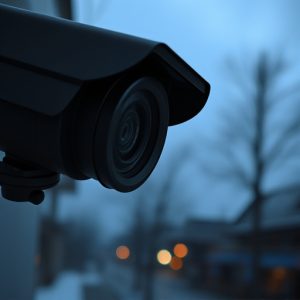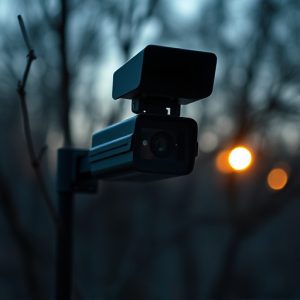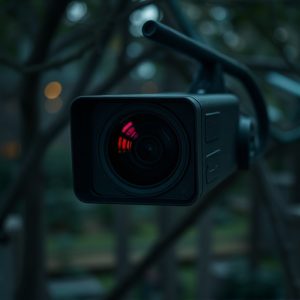Unveiling Hidden Cameras: Protecting Tenant Privacy in Rental Spaces
Hidden cameras with night vision recording capabilities have advanced, raising legal concerns for la…….
Hidden cameras with night vision recording capabilities have advanced, raising legal concerns for landlords and tenants. Landlords may use them for property protection but must follow strict regulations, especially in rental properties, where explicit consent from all parties is required. Violations can lead to legal consequences. In today's digital era, such surveillance is crucial for safety but invades privacy; thus, awareness of hidden spots empowers tenants while encouraging responsible use by landlords. Detecting these cameras requires meticulous observation and specialized tools, with regular checks on wiring and fixtures. Ethical considerations demand a balance between security needs and tenant privacy, with open communication and adherence to privacy laws mandatory. Working together, landlords and tenants can protect privacy without using hidden cameras with night vision recording capabilities.
In the digital age, privacy concerns have reached new heights, especially within rental properties. This article delves into the hidden world of secret surveillance spots, where tenants may not realize they’re being watched. From understanding the legal implications of hidden cameras with night vision recording to uncovering common placement tactics, we explore the ethical gray area. Learn how to detect and disrupt these devices, along with preventive measures for both landlords and tenants, ensuring a safer living environment.
- Understanding Hidden Cameras and Their Legal Implications
- Common Secret Surveillance Spots in Rental Properties
- How to Detect and Disrupt Hidden Cameras
- Ethical Considerations and Tenant Rights
- Preventive Measures for Landlords and Tenants Alike
Understanding Hidden Cameras and Their Legal Implications
Hidden cameras, especially those with night vision recording capabilities, have become increasingly sophisticated and stealthy, raising important legal questions for both landlords and tenants. These devices can be easily concealed in rental properties, allowing for surveillance of occupants without their knowledge. While landlords may use them to prevent property damage or ensure the safety of their assets, there are strict regulations governing their deployment. Many regions have laws in place that require explicit consent from all parties involved before installing such cameras, and their use is typically restricted to common areas or areas with a legitimate business need.
Tenants’ privacy rights are protected by these legal frameworks, ensuring they can live without the constant feeling of being watched. The presence of a hidden camera with night vision recording capabilities in a rental unit without proper notice or consent could be considered an invasion of privacy and a breach of lease terms, leading to potential legal repercussions for landlords. It’s crucial to understand these implications to foster trust between landlords and tenants and ensure compliance with the law.
Common Secret Surveillance Spots in Rental Properties
In today’s digital era, landlords and property managers have been known to employ sophisticated methods of surveillance, often with hidden camera technology, to monitor their rental properties. One of the most common tools used is a hidden camera with night vision recording capabilities. These tiny devices can be concealed almost anywhere—from everyday objects like smoke detectors, light switches, or electrical outlets, to more subtle locations such as inside false ceiling panels or behind mirrors. With infrared sensors and low-light imaging, these cameras capture detailed footage even in complete darkness, making them a covert yet effective way to ensure property security.
While some may argue that this level of surveillance infringes on privacy rights, it’s essential for landlords to maintain a safe environment for both themselves and potential tenants. In terms of rental property management, being aware of these hidden camera spots can empower tenants to be more vigilant about their personal spaces and also encourage landlords to use such measures responsibly and transparently.
How to Detect and Disrupt Hidden Cameras
Detecting hidden cameras in rental properties can be a challenging task, but with some keen observation and the right tools, it’s possible to uncover covert surveillance. One common method used by such devices is night vision recording, making them hard to spot with the naked eye. Start by inspecting any odd-looking electrical outlets or cables, as these could be points of access for hidden cameras. Look for signs of tampering with walls, ceilings, or doors, as well as any unusual markings or adhesives that might indicate the presence of a camera.
To disrupt these covert devices, consider investing in a camera detector designed to identify hidden cameras and GPS trackers. These tools can help you locate and disable active recording devices. Additionally, ensure all your electrical outlets are secure and sealed to prevent unauthorized access for future installations. Regularly checking your rental space’s wiring and fixtures can be an effective way to maintain privacy and peace of mind.
Ethical Considerations and Tenant Rights
The use of secret surveillance in rental properties raises significant ethical considerations and challenges tenant rights. While landlords have a legitimate interest in maintaining security, they must balance this against the privacy rights of their tenants. Installation of hidden cameras with night vision recording capabilities, often disguised as everyday objects, can create an atmosphere of mistrust and fear among residents.
Tenants have the right to expect a certain level of privacy within their homes, and the presence of such surveillance devices without their knowledge or consent is a violation of that trust. It’s crucial for landlords to disclose any security measures in place to ensure transparency and maintain open communication with tenants. Ethical use of surveillance technology involves proportionate responses to legitimate concerns while respecting individual freedoms and privacy laws.
Preventive Measures for Landlords and Tenants Alike
Both landlords and tenants can take proactive steps to prevent unwanted surveillance in rental properties. For landlords, installing hidden cameras with night vision recording capabilities should be approached with caution. Instead of using them as a monitoring tool, consider implementing robust security systems that respect tenant privacy. Regular maintenance checks, secure door locks, and advanced alarm systems can deter potential intruders without the need for covert observation.
Tenants, too, have a role to play in safeguarding their privacy. They should be vigilant about their surroundings, ensuring all doors and windows are securely locked at all times. Additionally, tenants can invest in privacy-enhancing devices like decoy cameras or privacy films for windows to deter potential camera installation. Staying informed about local laws pertaining to surveillance also empowers both parties to maintain a safe and private living environment.
In light of the above discussions, it’s evident that secret surveillance in rental properties, facilitated by hidden cameras with night vision recording capabilities, raises significant legal and ethical concerns. While landlords have legitimate reasons for security measures, the privacy rights of tenants must be paramount. Both parties should take proactive steps to prevent such intrusions, ensuring a safe and respectful living environment. By staying informed about common surveillance spots, understanding legal boundaries, and adopting preventive measures, everyone can contribute to maintaining trust and transparency in rental relationships.


